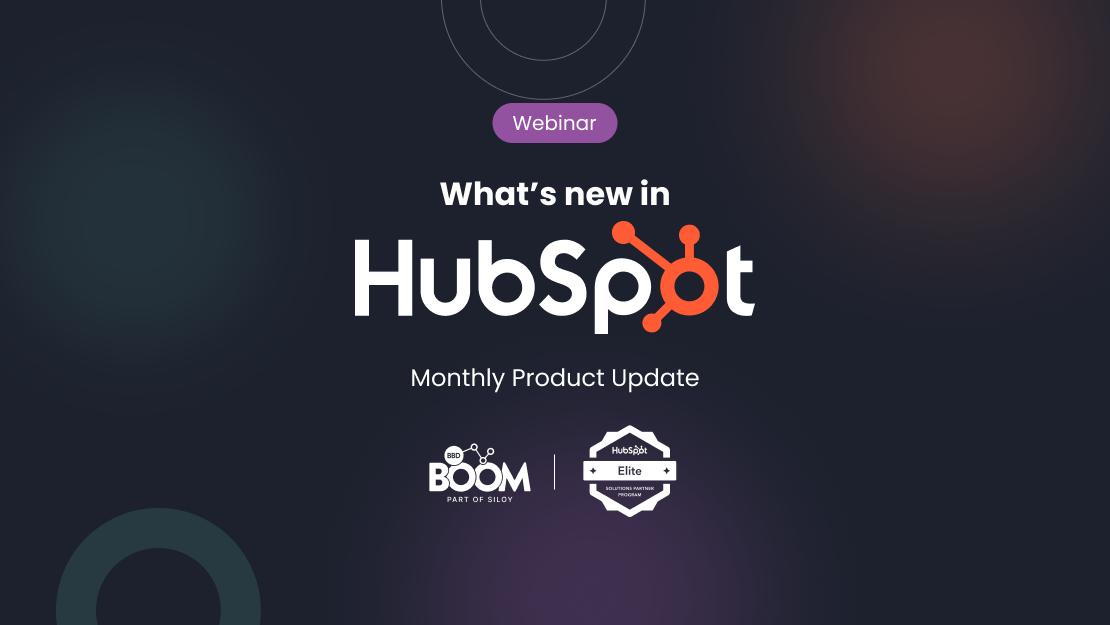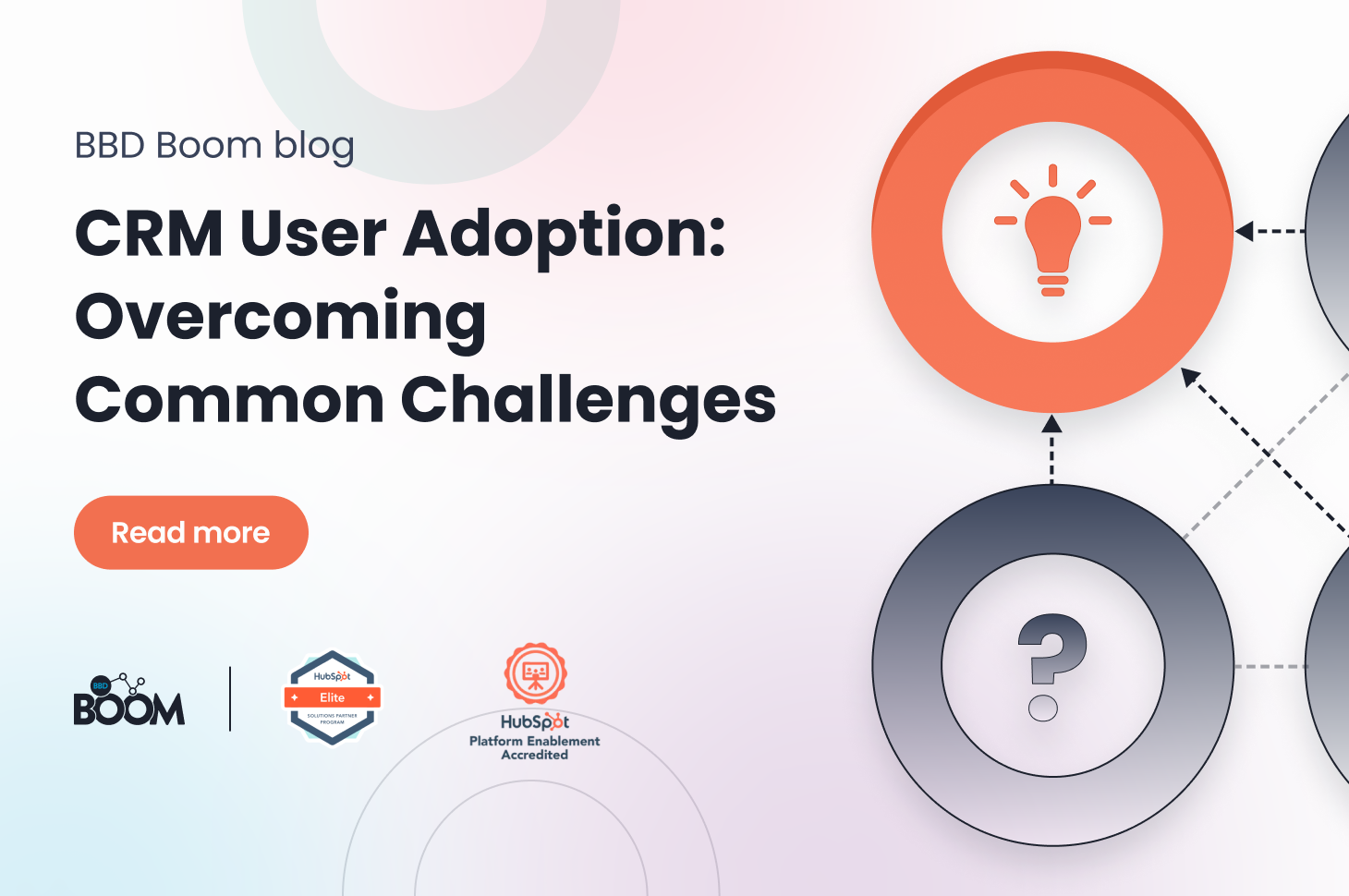Did you know a third of CRM adoptions fail to meet their objectives, often due to common yet avoidable challenges? Don’t let yourself fall into this statistic. With the help of this blog you can understand the frequent obstacles you may come across and we will provide you with practical solutions to help your business not only navigate but thrive in the journey of CRM adoption.
Why is CRM User Adoption Important?
Assuming that you've picked up the perfect CRM for your business, you want to ensure that you see a return on investment and a high user adoption rate. CRM user adoption refers to the process by which employees within an organisation begin to use and integrate the new system into their daily workflows. Effective user adoption means that the system is not only implemented but is actively used by the staff to its full potential, thereby maximising the features and benefits it offers.
Purchasing a CRM is a significant financial investment that can provide real business value, but without a proper adoption strategy and training it can result in a costly failure. This is why it's important to understand the challenges you might face along the way and how to overcome them.
How to Overcome CRM Adoption Challenges
CRM systems have become indispensable tools for businesses striving to streamline operations, improve customer interactions, and boost overall efficiency. However, despite their potential benefits, CRM adoption can be fraught with challenges. Implementing a CRM system often involves significant changes in processes, behaviours, and sometimes even company culture. So let's explore the common hurdles faced during CRM adoption and provide you with practical solutions to overcome them.
1. Resistance to Change
One of the most significant challenges in CRM adoption is resistance from employees. New systems can create uncertainty, with employees fearing changes to their daily tasks and routines.
Overcoming Resistance to Change
Involve employees early in the CRM selection and implementation process. Understand the challenges each team faces and choose a CRM that provides a solution. Communication is key - explain the benefits and how the system will make their work easier. Training sessions and workshops can also help employees become comfortable with the new system. Encourage feedback and address concerns promptly to foster a more positive attitude towards the change.
In our detailed guide below, you can find everything you need to know about CRM implementation, including a comprehensive checklist to help you engage effectively with each department in your organisation and ensure that your CRM solution meets the diverse needs across your business.
2. Lack of Clear Objectives
Implementing a CRM system without clear objectives can lead to confusion and poor utilisation. Without defined goals, it’s challenging to measure success or determine whether the CRM is meeting the organisation’s needs.
Setting Clear Objectives
Before adopting a CRM, define what you aim to achieve. These objectives could include improving customer satisfaction, increasing sales, or streamlining customer service processes. Clear, measurable goals provide a roadmap for implementation and help in assessing the CRM’s effectiveness. Regularly reviewing these goals and adjusting strategies as needed can ensure the CRM system continues to align with business objectives.
3. Data Quality Issues
A CRM system is only as good as the data it contains. This challenge often occurs due to the integration of data from multiple sources, inaccurate manual input or irregular update and if employees don’t trust the data in the CRM system, they may be hesitant to use it or may not use it at all.
Ensuring Data Quality
To maintain high data quality and ensure your team trusts and uses the data, establish strict data entry protocols and train employees on the importance of accurate data entry. Regular audits and data cleansing processes can help identify and rectify errors. Implementing automated tools for data validation and de-duplication can also enhance data quality.
4. Integration with Existing Systems
Integrating a CRM with existing systems such as ERP, marketing automation, or accounting software can be complex. Poor integration can lead to data silos, where information is not shared effectively across the organisation, negating the CRM’s benefits and causing users to constantly witch from one system to another.
Facilitating Seamless Integration
Choose a CRM that offers robust integration capabilities with your existing systems. Engage with IT professionals to ensure smooth integration and address any compatibility issues. Regularly test integrations to ensure they are working correctly and update them as needed. A seamless integration allows for a unified view of customer data, enhancing the overall efficiency of business operations and ensuring high user adoption.
5. Lack of Training and Support
Inadequate training and support often leads to employees struggling to use the CRM system effectively, which can reduce overall productivity and system utilisation.
Provide Training and Learning Resources
Invest in comprehensive training programs tailored to different user roles within the organisation. Offer continuous support through refresher courses, workshops and constant access to online learning resources. For example, HubSpot's Academy offers a range of free lessons and courses that can help employees become proficient in using the CRM. Additionally, keeping up with CRM product updates is crucial. CRM vendors often release new features and improvements, so staying informed through official communications, webinars, and training sessions ensures that employees can take full advantage of the latest tools and capabilities.
6. All-At-Once Implementation
Implementing a CRM system across an entire organisation simultaneously can be overwhelming and costly. This approach often leads to logistical challenges, extended training periods, and lower user adoption rates due to the complexity of managing such a large-scale change.
Taking a Phased Approach
A phased implementation approach, where the CRM is rolled out team by team or department by department, can help mitigate these challenges. Starting with a pilot project in a single department allows the organisation to gather feedback, identify potential issues, and make necessary adjustments before a wider rollout. This method also spreads out the costs over time, making the investment more manageable. Additionally, training can be more focused and personalised, leading to better user adoption and smoother transitions.
7. System Customisation Challenges
A one-size-fits-all CRM solution may not meet the specific needs of every business. Customisation is often required to fit the needs of different teams. Moreover, a CRM system with a complex user interface can deter employees from using it regularly. If the system is not intuitive, employees may revert to their old ways of working.
Effective Customisation
When choosing a CRM, look for solutions that offer flexible customisation options and user-friendly interface. Engage with experienced CRM consultants who can help tailor the system to your unique business requirements. Clearly define your customisation needs for each team and prioritise them to avoid unnecessary complexity. Regularly review and update the set up of your CRM to ensure it continues to meet evolving business and users' needs.
8. Leadership and Change Management Issues
Effective leadership and change management are crucial for successful CRM user adoption. When these areas are not handled properly, they can significantly impact the effectiveness of the CRM system and the adoption rates among employees. Issues can stem from inadequate planning, poor communication, insufficient support, and lack of strong leadership during the transition to a new CRM system.
Address Change Management
To mitigate these issues and improve CRM user adoption rates, consider developing a detailed plan that outlines the steps necessary for successful CRM implementation. This plan should include timelines, responsibilities, and milestones to track progress. Leaders should actively champion the CRM initiative, demonstrating its importance and aligning it with the organisation's strategic goals. Their commitment can motivate employees to follow suit and embrace the new system.
HubSpot CRM Adoption Partner
 If HubSpot is your CRM of choice, you have the advantage of utilising a partner to assist with adoption. Partnering with a CRM adoption specialist can provide invaluable support in overcoming challenges, ensure a smoother transition, increased user engagement, and maximised ROI on your CRM investment.
If HubSpot is your CRM of choice, you have the advantage of utilising a partner to assist with adoption. Partnering with a CRM adoption specialist can provide invaluable support in overcoming challenges, ensure a smoother transition, increased user engagement, and maximised ROI on your CRM investment.
The HubSpot Platform Enablement Accreditation is a certification program offered by HubSpot to partners who have demonstrated expertise and strategic experience in driving user adoption by delivering tailored HubSpot training to large teams and facilitating effective change management.
At BBD Boom, we are proud to be one of the few partners to have been awarded with this accreditation that demonstrates the rigorous training and extensive knowledge we have of the platform. The Platform Enablement accreditation signifies our deep commitment to not just implementing software solutions, but also ensuring that these solutions are fully integrated into the client's business processes and culture through strategic training and support.
If your business is looking to enhance HubSpot team adoption, our expert team is ready to guide you through every step of the process, ensuring a tailored approach that meets your unique needs and maximises user engagement. Get in touch here or check out our HubSpot training services here.
.png?width=877&height=508&name=bbd-boom-siloy-navy+blue-logo%20(1).png)
.png)



-1.png?width=50&name=Webinar%20Speakers%20(1)-1.png)


.png?width=2085&height=626&name=Landing%20Page%20Banner%20(Webinar).png)


-1.png?width=90&name=Webinar%20Speakers%20(1)-1.png)


